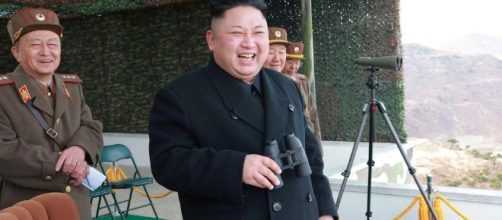North Korea has launched yet another Ballistic Missile that appears to have landed in Japan's exclusive economic zone. The missile is believed to have been fired at 11.42 PM local time and to have flown for about 45 minutes. This latest launch comes just days after the U.S Senate voted to renew sanctions on North Korea, Russia, and Iran. This act of defiance by Pyongyang shows, yet again, that they do not feel threatened by sanctions from the West.
The timing of the launch
North Korea is known to choose the dates of its weapons tests very carefully.
Their last test, an ICBM launch, was conducted on July 4, United States Independence Day. Kim Jong-un, called the ICBM test a "package of gifts" for the U.S. This latest missile launch also comes at an interesting time for two reasons. First, the U.S. Senate has just passed a bill that would increase sanctions on North Korea. The bill was initially only supposed to target Iran and Russia but Democrat and Republican lawmakers decided to revise the bill to include North Korea. By doing this, they hoped the sanctions would hurt Pyongyang's capabilities to continue their nuclear weapons ambitions. Pyongyang's decision to launch a ballistic missile anyway, despite this recent bill that would impose sanctions on them, shows their disregard towards such policies and their relentless will to pursue and expand their weapons programs.
The second reason why we should pay attention to the date of the launch is that it comes just one day after the 64th anniversary of the armistice that ended the Korean War. In South Korea, the day is remembered as one that brought peace after a brutal war, but in North Korea, they celebrate this day as their "Victory Day". They see this date as the day they were able to take back control of their country from the "U.S imperialists" and they celebrate it to commemorate the Kim family's rise to power.
U.S. officials had expressed their fears about the possibility that Pyongyang might choose to launch another missile on this particular date. Both U.S. and South Korean intelligence officials said that transporter vehicles carrying launching equipment had been seen on the move in North Korea, which suggested that they were preparing to launch another missile.
A defiant North Korea
It is no secret that the threat that the North Korean issue is on top of agendas of government leaders around the world. The international community faces an uphill battle with Pyongyang as nothing seems to be threatening Kim Jong-un enough for him to decide to halt all weapons development programs. Sanctions have not worked and the North has yet to show any interest in dialogue with South Korea. The pressure is now mostly on the United States, South Korea, and China to develop a plan that will successfully deter North Korea from conducting any more ballistic missile launches and from seeking to gain nuclear capabilities.


